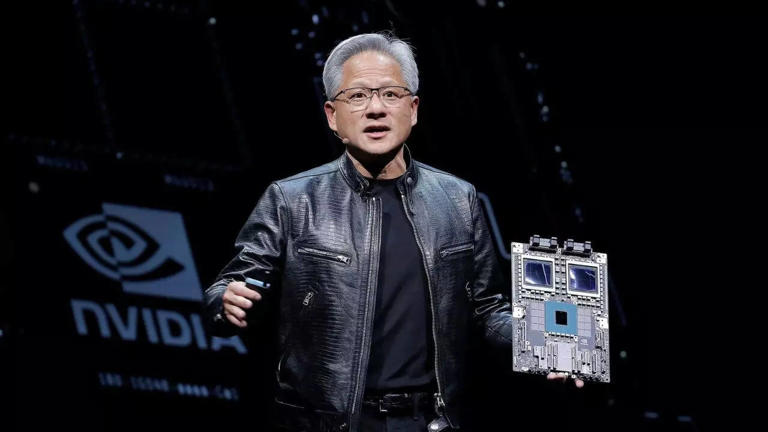
Introduction: China’s New Tech Warning
China tells companies to avoid Nvidia AI chips in a move that deepens the ongoing technology battle between Beijing and Washington. The latest development targets Nvidia’s H20 AI chip and AMD’s MI308, both specially designed to meet US export restrictions.
The guidance, issued to various Chinese firms over recent weeks, warns against using these chips—especially for government or national security projects. This not only hampers Nvidia’s ability to regain lost market share but also signals China’s intent to accelerate domestic chip production.
The Target: Nvidia H20 AI Chips

The Nvidia H20 AI chip was created as a “watered-down” version of Nvidia’s high-performance AI chips to comply with US export controls. While less powerful than US models, it was still positioned as a strong option for the Chinese market.
However, with Beijing’s recent notice, its future in China looks uncertain. Reports suggest state media has questioned the security and reliability of the H20, putting additional pressure on Chinese companies to adopt domestic alternatives.
AMD MI308 Caught in the Crossfire
The restrictions also extend to AMD’s MI308 AI chip, which—like the H20—was tailored for Chinese buyers. Both chips were part of a deal that gave the US government a 15% cut of China revenue in exchange for export licenses.
Now, with China pushing back, the deal’s profitability is in jeopardy.
Government Push for Domestic AI Chips
Chinese authorities have made it clear: the nation should reduce dependency on Western semiconductors. This fits into Beijing’s long-term plan to develop a self-reliant AI and semiconductor ecosystem.
Local companies such as Huawei’s HiSilicon and state-backed chip startups are expected to benefit from this shift.
Security Concerns and Accusations
Officials worry Nvidia’s H20 chips might include location-tracking or remote shutdown features—accusations Nvidia has vehemently denied. While there’s no public evidence to support these claims, the suspicion alone could sway purchasing decisions.
You can read more about global chip security debates on Bloomberg’s technology coverage.
The Trump Factor and Political Angle
Former President Donald Trump has labeled the H20 chip “obsolete”, suggesting China already possesses similar technology. His statement aligns with US Commerce Secretary Howard Lutnick’s claim that the H20 deal was part of a larger trade agreement involving rare-earth minerals.
Impact on Nvidia and AMD’s Revenue
China accounts for billions of dollars in potential AI chip revenue. With this ban-like guidance, Nvidia and AMD face significant financial setbacks. The long-term impact could force both companies to pivot to other emerging markets.
China’s Self-Reliance Strategy
The move strengthens China’s Made in China 2025 initiative, which promotes domestic innovation in key tech sectors. AI chips are central to this vision, and reducing foreign dependency is now more urgent than ever.
Tech War Ripple Effects on Global AI
This escalation in the chip war could slow global AI development, as restrictions limit collaboration and tech sharing. Countries may double down on regional AI alliances.
Expert Opinions on the Ban
Industry analysts believe the directive is both political and economic, aiming to push Western companies out while boosting local innovation. Others see it as a temporary negotiation tactic.
Possible Next Moves for Nvidia
Nvidia could:
- Develop even more localized chip models
- Partner with Chinese tech firms for co-production
- Increase focus on India, Southeast Asia, and the Middle East
Global Semiconductor Battle Timeline
- 2022: US introduces strict chip export rules to China
- 2023: Nvidia launches H20 to comply with rules
- 2024: China warns against H20 & MI308 for sensitive projects
- 2025: Full-scale push for local AI chip adoption
What This Means for AI Development
The chip war is no longer just about sales—it’s about technological sovereignty. AI progress may become fragmented across regions, with innovation speed depending on local production capabilities.
FAQs
Q1: Why is China telling companies to avoid Nvidia AI chips?
A: Over security concerns and to promote domestic chip development.
Q2: Which Nvidia chip is affected?
A: The H20 AI chip, designed for the Chinese market.
Q3: Does this also affect AMD?
A: Yes, AMD’s MI308 is also included in the guidance.
Q4: Is this an official ban?
A: No, but it’s strong government guidance that discourages use.
Q5: How will this impact Nvidia’s business?
A: It could significantly reduce their China-based revenue.
Q6: Could Nvidia work with Chinese companies to adapt?
A: Possibly, through joint ventures or new chip models.


